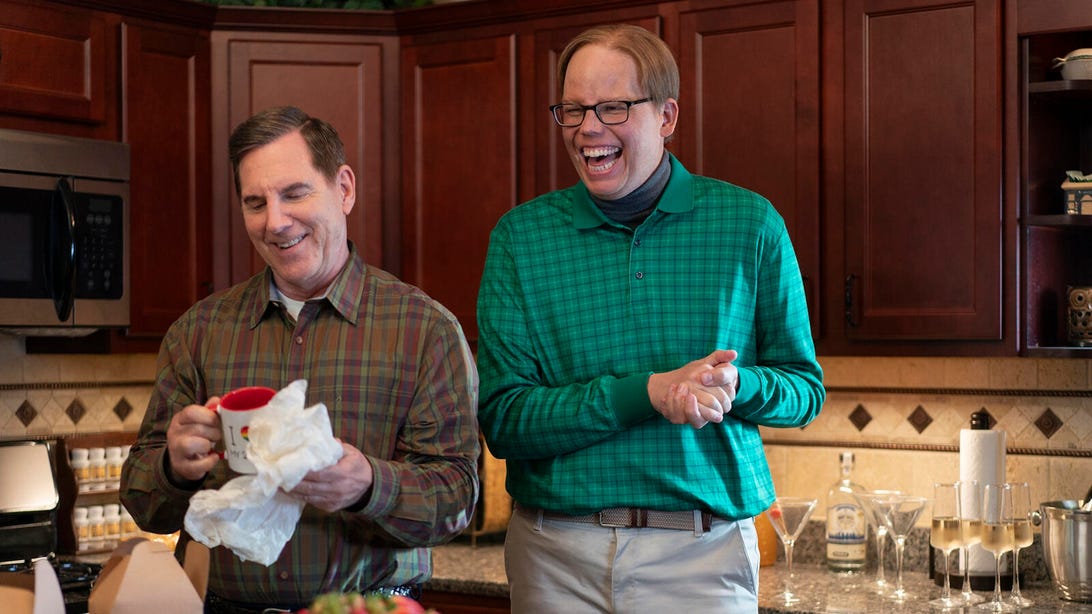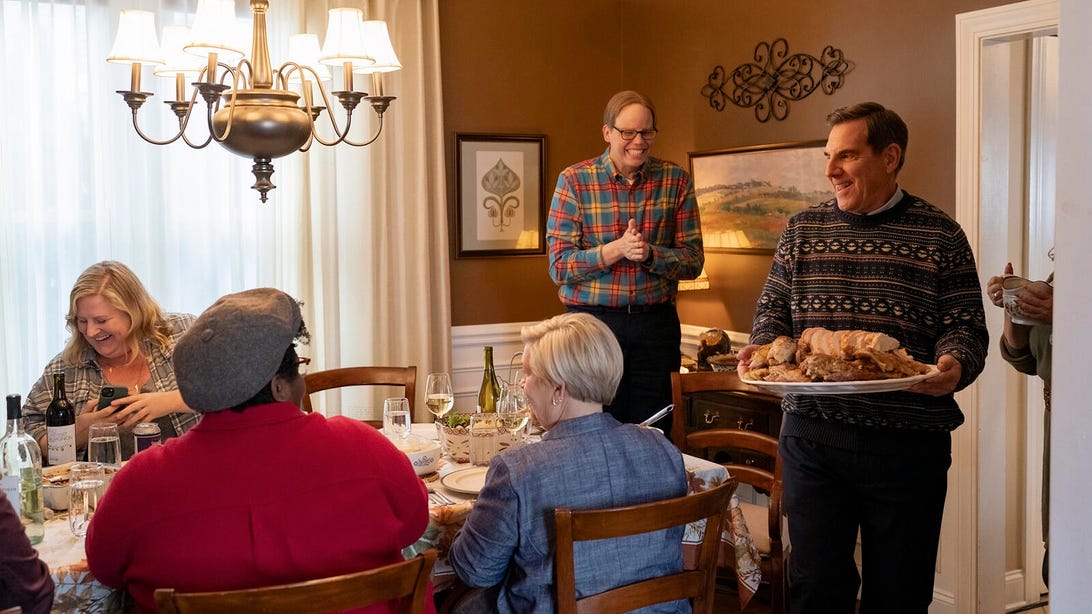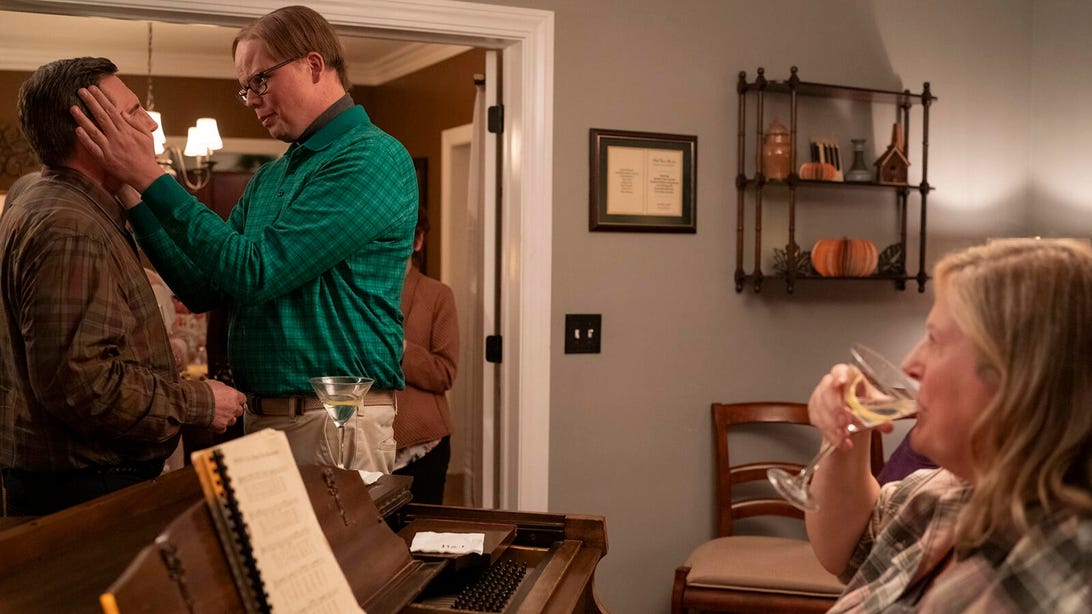Join or Sign In
Sign in to customize your TV listings
By joining TV Guide, you agree to our Terms of Use and acknowledge the data practices in our Privacy Policy.
Tim Bagley Found Gratitude in Somebody Somewhere's Thanksgiving Dinner
'It's because of the loss that the happiness is so great'

Tim Bagley and Jeff Hiller, Somebody Somewhere
Sandy Morris/HBO[The following contains spoilers for Season 3, Episode 5 of Somebody Somewhere, "Num Nums."]
When character actor and comedian Tim Bagley joined the cast of Somebody Somewhere in its second season, he came in as a fan—particularly of the character Joel (Jeff Hiller), whose primary love interest he would be playing. At the time, Bagley was only set to appear in a few episodes as Brad, the lovable weirdo. But in the gentle dramedy's third and final season, the character is more present than ever, a complex man whose warmth and thoughtfulness make him quietly aspirational.
"I can't even tell you what a joy it is to look into Jeff's eyes, and the way he's so loving," Bagley told TV Guide. Perhaps we have that mutual affection and respect to thank for the believability of Joel and Brad's love story, an unusual one despite the strides in queer representation on TV in recent years. In addition to providing insight on Brad's role in this week's Thanksgiving episode, Bagley discussed his own struggle with passing for straight, prejudices in the gay community, and what he'll miss about the show as both a performer and fan.
ALSO READ: The complete guide to fall TV

Bridget Everett, Jeff Hiller, and Tim Bagley, Somebody Somewhere
Sandy Morris/HBOI love Brad's road rage moment in last week's episode, which almost feels more reminiscent of your other comedic performances.
Tim Bagley: I initially played it not as much, and Jay Duplass, the director, encouraged me to really lose it. I remember saying, "Really? This feels really over the top." He goes, "No, it's good." One of the things I love about Somebody Somewhere is that all of the characters are imperfect. Somebody like Brad, who seems like he's really got it together, is clearly shoving down all these emotions that he doesn't know how to express. It came out in road rage.
In that same episode, we see Joel and Brad explicitly discuss the divide in how well they can each pass as straight. How has that experience shaped Brad?
Bagley: As an adult, Brad is trying to chip away all of that negative reinforcement that he got from the church and his family. There's a line where he kind of knows there's power in being a little bit more macho than Joel. He says, "You're not the athlete that I am." Brad is not athletic, but it shows that kind of ridiculous wielding of power in a relationship. He is still traumatized, but he is evolved enough to be attracted to Joel. Joel is all of himself: He is 100 percent of who he is, and he's unabashedly who he is, and that's really attractive to Brad. I understand that; I like somebody who's really confident in who they are. That's appealing to me.
I was curious if you've had conversations like this one before.
Bagley: I can say that I've had those conversations with myself before. When I was younger, every agent — everybody in my life who was a guide said, "Don't be too gay. Don't reveal that part of yourself. It will limit you, and it will not help you or serve you." Everybody. A lot of gay people go through this process of figuring out how to untrain what has been told to them by schools, by churches, by synagogues, by the government, by everybody — their parents, their friends, their bosses. I always feel like we're all in various stages of self-acceptance. It's taken me many years to get to the point where I'm just really good with how I am.
Still, to this day, I have friends that are my age who — I'll say, "This guy is perfect for you," and they'll say to me, "Mm, I can hear it in his voice." "You can hear what?" "I can hear that he's gay in his voice." I'm like, "But everything about him is great." What it really boils down to is self-loathing. There's a lot of self-loathing, because we were trained as young people to be that way. I don't really think like that anymore, but when I was younger, I did. If I'm attracted to somebody, I'm attracted to them. I don't see if they're masculine or feminine. I'm attracted to men.
A lot of people use the guise of "preference" when it's actually a prejudice.
Bagley: Yes. I have a friend that says to me, "No, I'm just attracted to masculine guys, that's all." And he's feminine. I just think, "What do you hate about that part of yourself that you won't look at somebody who has softer qualities?" I think that all gay men are in various levels of self-acceptance.
Some of these young ones, now, are very confident out of the gate. Now, they have gay-straight alliances in high schools and teachers who wear little rainbow badges to let kids know there's somebody there who is an ally. When I was younger, there was no LGBTQ [network], there were no support groups in school. You were alone and you figured it out on your own, with partners who you would find randomly. There was no culture of support. When I was reaching puberty, it was still considered a mental illness in the DSM–III.
These same subjects come up a bit in this week's Thanksgiving dinner episode. How did you play Brad's emotional responses to Susan's intrusive questions about his family? I was really struck by the calmness and honesty there. There's still clearly a depth of feeling there, but there's some distance from it.
Bagley: I'll tell you this: The director of that episode, Lennon Parham, gave me a brilliant note that was crucial in how I played. All of those questions are very emotional to me, so when we did it the first time, I was very emotional. She said to me, "This is your [Brad's] story. You've lived this story. You know this story. You're comfortable with this story. You've dealt with people feeling entitled to ask about your private life. So kind of try to answer Susan's questions and get to your mashed potatoes. Go through it, and know that this is your life, and that it's something you know very well. Be more matter of fact about it, and don't let it stir you up emotionally." I know that's probably how I would deal with somebody in my life. I mean, I'm sure in the past I have dealt with it, but I blacked it all out for survival. [Laughs.]
It feels like there's this sense of Midwest politeness around the table, with everybody knowing which subjects they can and can't bring up. Then this person comes barreling in just asking to satisfy her own curiosity.
Bagley: Exactly. It is very Midwestern. There's a sensibility and a respect in how you deal with people. I'm from the Midwest.
I'm from Michigan.
Bagley: Michigan and Wisconsin for me, both of them. When people ask me things that I'm shocked they're even asking, I always answer politely and honestly and with appreciation that they're trying to understand and connect.
Brad says he loved Amy, his ex-wife, and considered her his best friend. One thing I really admire about Brad is that ability to see people as human and complicated. I'm sure there's an element of anger there from not being able to see his sons, but I respect his ability to acknowledge that he loves Amy.
Bagley: I appreciate that, too. In preparing it emotionally, I thought about how when I was younger, if I would've had children who would now be in their 30s, there were lots of people who got married. They were called lavender marriages. They would marry their best friend, and it wasn't necessarily that sexual, but they could perform. Brad's love for her is still there, and I can understand that. I had girlfriends when I was younger, and I still love them. It was a different time, and I think Brad even says that. But when you love somebody, that love can shift and change — and sometimes if you have a horrible breakup, it can just become anger — but there's still, underneath all that, a love for that person, I think. At least, I've never moved on from a relationship and not still loved them but just shifted it in a different way.
In this show, melancholy is such an important element to counterbalance the kind of warm fuzzy feelings. I actually thought of Patricia Highsmith's The Price of Salt and the film adaptation, Carol. When the book was published, featuring a happy ending for a queer couple was basically a first. But Carol still loses her daughter.
Bagley: Yes. Brad never thought he would experience love again, or find that kind of love. He didn't have that same thing with his wife, because there was always this secret and this other part to him. He's looking at these friends and seeing this partner and this life that they're building in this house, and they're sitting around at Thanksgiving, and he's overwhelmed with gratitude for the way that his life has worked out. When you go through something as traumatic as coming out in a Christian church that doesn't accept you, and your Christian wife feels embarrassed there — then you're able to find a church that does accept you, you really appreciate it. And then when you find a partner — it's because of the loss that the happiness is so great.

Tim Bagley, Jeff Hiller, and Bridget Everett, Somebody Somewhere
Sandy Morris/HBOWhat was the vibe like filming this Thanksgiving dinner scene?
Bagley: It was kind of an intense scene: so many people sitting around and all these shots at all these different angles. This is probably really stupid, but I think it will answer your question. Bridget [Everett] found some app that had fart noises. She was playing it, and we were all giggling in between takes. Then we started this process where each person would get up, and she would play something on the app. You wouldn't know what it was. You would walk away and try to match your walk with whatever the fart noise was. It was really pathetic and childlike, but I think it's how we were able to get through that heavy scene. It was just kind of a fun, playful way to take a breath between takes.
It feels like there's a real infectious energy, so I can imagine that keeping spirits up.
Bagley: All of these people, we all enjoy each other very much, including the crew. We were all very close with the crew. It was a very collaborative shoot.
What will you miss about this show and this character, as either a viewer or a performer? You've mentioned you'd seen the show before you were cast.
Bagley: I stumbled upon the first season and loved it. I remember within five minutes of seeing Jeff as Joel, saying, "Oh my god, I love him. He's perfect for this role." So when I stepped into it, it wasn't difficult to love him, even though I didn't know him. I can't even tell you what a joy it is to look into Jeff's eyes, and the way he's so loving. I think what I'll miss is the intimacy of those relationships — I'm also including the directors and the cast and crew and the writers and the producers.
The vibe of this show is pretty different from a lot of the other comedic work you've done.
Bagley: A lot of times, you get a script, and it's like, "Go here, and then put the salad down and say, 'Here's your salad, ma'am,'" and that's it. One of the last things I did, the director told me she wanted me to be a gay clown. I was like, "What? I don't think you can even say that anymore." As an actor, especially my age, very few times do they want to see me in a romantic situation. I do comedy where it's fast, fast, fast, don't take too much time, just hit the punch line and go. For this, what's been a joy for me is just to be able to dig deeper. When I was on the park bench with Jeff in the second season, I remember Jay Duplass said to me, "I know you're used to pace, but just take your time. Listen and respond naturally and just breathe and listen." In comedy, I've never been given that note before.
I'll miss the sweetness of Brad and his eagerness to move forward, being guided by his faith, and trying to be the best person who he can be. I love that about him, because I am absolutely rotten. I am absolutely garbage. [Laughs.] He's a good person who is much better than me.
Somebody Somewhere Season 3 airs Sundays at 10:30/9:30c on HBO.